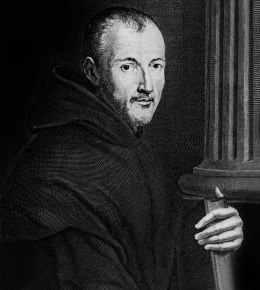
Abbe Marin Mersenne (1588-1648), discoverer of the Mersenne primes
It’s mathematicians’ idea of an arms race: the unending quest to find the largest prime number. Like an archaeological expedition, a new number has taken top honors as the longest — and it’s over 17 million digits long. Curtis Cooper, a researcher at the University of Central Missouri, reportedly spent four years searching for the new prime number. And in late January, his quest was confirmed. Behold the new longest prime number in the world: 257,885,161 – 1.
The new discovery, at 17,425,170 digits, crushes the 2008 record number of 12,978,189 digits. Cooper is something of a legend when it comes to prime-number discovery: this is the third one found by him and his team.
Prime numbers are numbers that can only be divided by themselves and 1, with the first-appearing ones being 2,3,5,7 and 11. This new king of primes is also a member of a rare collection known as the Mersenne primes. Named after their discoverer Marin Mersenne, a 17th century French monk, the numbers are all expressed as 2 raised to the power of “P” minus 1, of which P is also a prime. The newly identified number is the 48th known Mersenne prime.
(MORE: Best Inventions of 2008: The 46th Mersenne Prime)
While searching for prime numbers could be a laborious task, as every number has to be thoroughly tested for divisors, this and all other largest prime numbers are now found via an Internet searching system called the Great Internet Mersenne Prime Search. The system, abbreviated to GIMPS, harnesses the computing power of 360,000 volunteer processors to find new, ever-larger primes, according to the Huffington Post.
After Cooper made his discovery, one computer among his prime-searching network spent 39 days to prove that the number was truly prime. Other independent researchers, according to the New Scientist, then verified the discovery.
There is little known mathematical value to finding new primes, but these rare numbers are prized as badges of honors because of their sheer rarity. “Every time I find one it is incredible,” Cooper told the Associated Press. “I kind of consider it like climbing Mount Everest or finding a really rare diamond or landing somebody on the moon. It’s an accomplishment. It’s a scientific feat.” For Cooper, there is also a monetary payoff alongside his 17-million-digit glory, though it has starkly fewer digits than the number he discovered. He’ll receive a $3,000 research award.
And while finding the next longest prime becomes exponentially trickier, there’s always room for one more: ancient Greek mathematician Euclid famously proved there are an infinite number of prime numbers out there. In fact, the race is on to find a 100-million-digit prime number. And the Associated Press reports that the Electronic Frontier Foundation is offering a $150,000 reward for discovering that number.






